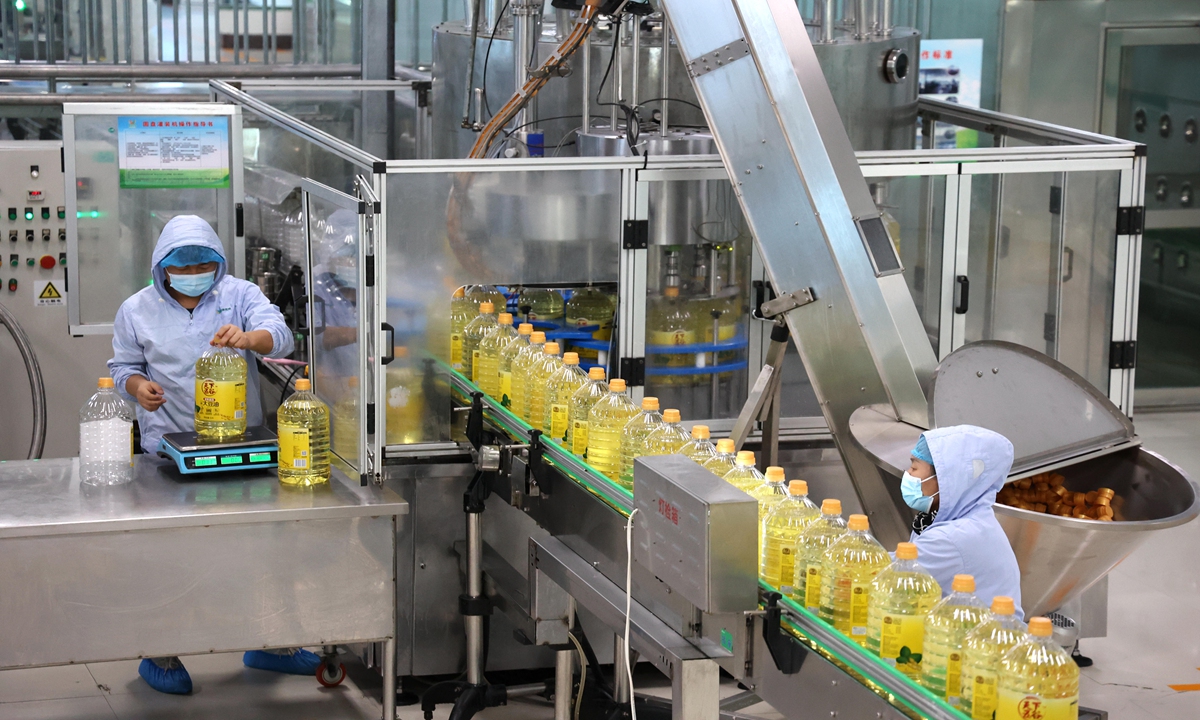Sinograin’s edible oil removed from Taobao.com as Chinese netizens call for investigation of alleged contamination

Workers process edible oil at a factory in Boxing county, East China's Shandong Province on January 8, 2024. Photo: cnsphoto
Sinograin's edible oil products have been removed from Chinese e-commerce platform Taobao by press time on Tuesday morning, as the food company has embroiled in a food safety scandal of "contaminated transportation" of food and chemical liquids in same vehicles, and some Chinese netizens called for a boycott of the products.
On Tuesday morning, only one product of Jinding, the edible oil brand belonging to China Grain Reserves Group (Sinograin), remained online, while several other products disappeared from Taobao.
A representative from the store told the Global Times that "all of the products on sale meet related national food safety standards."
Jinding edible oil products remain on sale on JD.com, another major shopping portal in China.
In addition, the selling of the edible oil products of Hopefull Grain and Oil, the other company allegedly involved in the scandal, remain on both e-commerce platforms on Tuesday.
On July 2, a report by the Beijing News revealed that it has become an "open secret" in the tanker truck industry over the mixed transportation of food and chemical liquids in the same vehicles, without cleaning in between.
In order to cut costs, many operators do not clean the tanks, and edible oil producers do not check the tanks in line with the regulations, leading to chemical residue and contamination of edible oil.
The report mentions the two companies.
The Langfang market supervision administration said on Tuesday that local government is conducting investigation into the reported case and will publish the result once probe is completed, Yicai reported.
Sinograin said on Saturday that it has launched a large-scale internal inspection following the report, vowing severe punishment if any wrong practice is found. Hopefull Grain and Oil replied that the tankers do not belong to the company, and Hopefull-branded edible oil "has no quality problem", the Economic View reported on Monday.
However, Chinese netizens are skeptical about the company's statement, with some calling for a boycott of their products. A net user posted on Sina Weibo: "the companies should be held accountable, as they haven't checked whether these tankers meet the requirements for transporting edible oil."
The main component of coal oil is hydrocarbon, which involves unsaturated-hydrocarbon, sulfide and other elements which will cause poisoning to human body if a person uses the oil for a long period of time, Zhu Yi, an associate professor of food safety and nutrition at the China Agricultural University in Beijing, told the Global Times on Tuesday.
"If a tanker designed for transporting cooking oil also transports other chemical liquids, toxic residues may remain inside, posing unpredictable risks to human body," Zhu said. "For example, organic solvents and heavy metals can harm the respiratory and digestive systems," she added.



